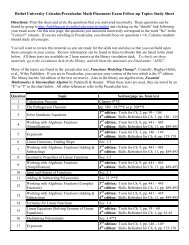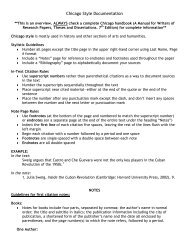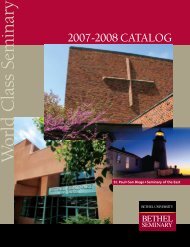here - College of Arts & Sciences - Bethel University
here - College of Arts & Sciences - Bethel University
here - College of Arts & Sciences - Bethel University
You also want an ePaper? Increase the reach of your titles
YUMPU automatically turns print PDFs into web optimized ePapers that Google loves.
Relative importance <strong>of</strong> on-case argumentation to the critic in decision-making:<br />
At a minimum, debaters should be able to respond to the case, illustrate how it interacts<br />
with <strong>of</strong>f-case argumentation, and (if gov) be able to uphold their advocacy. If the opp<br />
wishes to go for a an <strong>of</strong>f-case argument, please illustrate how the case interacts<br />
(generates, begs, initiates, etc.) with the <strong>of</strong>f-case, do not simply presume that I will do<br />
that work for you.<br />
Openness to critical/performative styles <strong>of</strong> debating:<br />
I am very open to critical/performative styles <strong>of</strong> debating. But, rest assured, I have seen<br />
this a lot, in forums that allow for a more developed and nuanced articulation <strong>of</strong> critical<br />
arguments. This means please use critical theory wisely: show how the gov/opp<br />
necessitates the critical argument, the interaction <strong>of</strong> debate with the critical theorist, and<br />
how I should adjudicate the kritik/performance. If you are opposing a critical argument<br />
using a policy/traditional framework, try a both/and approach with me: don't tell me that<br />
this argument is simply bad, but instead tell me why its bad in this round, and the ways in<br />
which it undercuts, obfuscates your advocacy...etc.<br />
Any additional comments:<br />
Harvey, Korry<br />
Western Washington <strong>University</strong><br />
Background <strong>of</strong> the critic:<br />
Overview: My background comes primarily from a policy making paradigm. A specific<br />
plan <strong>of</strong>ten tends to <strong>of</strong>fer the best focus for debate. However, I understand that not all<br />
resolutions are translatable into “policy” language, and feel that the resolution should best<br />
dictate the type <strong>of</strong> debate to be had. In those cases, the teams should clarify what<br />
framework/criteria they are utilizing, and how it should be evaluated (a weighing<br />
mechanism). I have no problem with critical debates and am willing to listen to any<br />
framework the teams feel is appropriate for the debate. I think that debate is both an<br />
educational exercise and a game—that’s what makes it fun.<br />
76
















